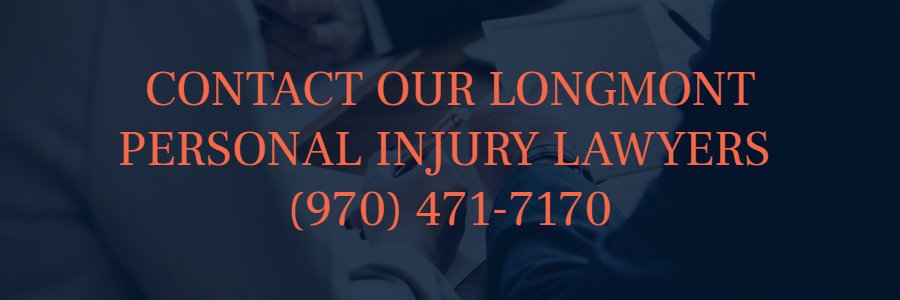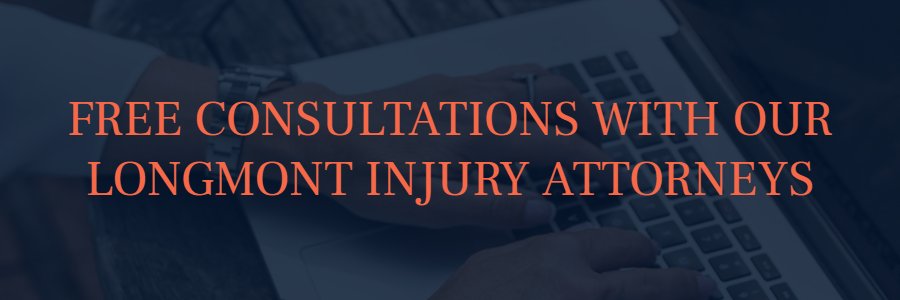Longmont Personal Injury Attorney
Serious injuries can leave victims with tremendous pain and suffering, and they can lead to major expenses. At Cannon Law, our Longmont personal injury attorneys are here to help if you or a loved one have been harmed due to the negligent actions of another person. We have extensive experience handling personal injury claims in the Boulder County area, and we are ready to help you secure maximum compensation for your losses.
For a free consultation, contact our Longmont personal injury lawyers to discuss the unique circumstances of your case.
Longmont, CO Personal Injury Resources
- Why Choose Cannon Law to Help With Your Claim?
- What Will a PI Attorney Do For My Case?
- What Are Common Causes of Personal Injuries?
- What Damages Can Be Recovered After a Personal Injury Accident in Longmont, CO?
- What Is the Time Limit to File a Personal Injury Claim in Colorado?
- Should I Accept an Insurance Settlement Offer?
- Can I Recover Damages if I Am Partially at Fault for an Accident in Colorado?
- Contact Us
Why Choose Cannon Law to Help With Your Claim?
In the aftermath of sustaining an injury caused by another person, you need an accident attorney by your side with extensive experience handling these cases. Cannon Law is here to help.
- We have extensive resources necessary to conduct thorough investigations into personal injury claims, and we regularly work with other lawyers, doctors, and expert witnesses to achieve our clients’ goals.
- We work individually with each client to create a unique strategy because we do not believe that a one-size-fits-all solution ever works.
- Our attorneys are skilled in negotiating with insurance companies to ensure that you receive fair compensation for your injuries and damages.
- We handle all Longmont personal injury cases on a contingency fee basis, which means we will not collect any legal fees until we secure the compensation you deserve.
What Will a PI Attorney Do For My Case?
A Longmont personal injury lawyer is often necessary because victims may not have the resources they need to conduct a full investigation into their case. An attorney will have the ability to:
- Obtain all evidence related to the injury, including photographic evidence, possible video surveillance, eyewitness statements, accident reports, and more.
- Work with trusted medical and economic professionals to ensure their client is properly cared for and that their total expenses are calculated correctly.
- Handle negotiations with all parties involved, including aggressive insurance carriers, to secure full compensation for their client.
What Are Common Causes of Personal Injuries?
Anytime a person sustains an injury that is caused by someone else, a company, or other entity, they should be able to recover compensation for their losses. Personal injury cases arise in various ways in Longmont and the surrounding areas of Boulder County. At Cannon Law, we regularly help clients who have been injured due to the following:
- Car accidents
- Motorcycle accidents
- Truck accidents
- Bicycle accidents
- Pedestrian accidents
- Uber and Lyft accidents
- Defective products
- Slip and fall incidents
- Other premises liability incidents
We help clients who have sustained a wide variety of injuries in these cases. It is not uncommon for our team to help clients who are suffering from the following:
- Broken and dislocated bones
- Severe lacerations or amputations
- Spinal cord injuries with possible paralysis
- Traumatic brain injuries
- Internal organ damage or internal bleeding
- Injuries that cause scarring or disfigurement
- Severe emotional and psychological injuries
What Damages Can Be Recovered After a Personal Injury Accident in Longmont, CO?
One of the first questions that victims of personal injuries ask is – What kind of compensation can I receive for this claim? This is important, and the team at Cannon Law has extensive experience helping Longmont personal injury victims recover the following:
- All medical expenses related to the incident
- Lost wages if a victim cannot work
- Pain and suffering damages
- Loss of personal enjoyment damages
- Possible punitive damages against a grossly negligent party
- Compensation based on the breach of the responsible party’s duty of care
What Is the Time Limit to File a Personal Injury Claim in Colorado?
Depending on the cause of the injury, the vast majority of claims must be filed within two or three years.
It’s important to act quickly, as waiting too long can result in losing the ability to seek compensation. The steps involved in filing a personal injury claim include gathering evidence, assessing damages, and negotiating with insurance companies. Working with an experienced attorney can ensure all deadlines are met, and your case is properly prepared for the best possible outcome.
Non-Car Accident Personal Injury Claims
In the State of Colorado the time limit, known legally as the statute of limitations, is two years from the date the injury occurred to file the claim in court. This two year time limit accounts for negligence, slip and fall accidents, assaults and other tortious claims.
Injury Claims From Car Accidents
If the injuries sustained resulted from the use – or operation of a motor vehicle – the statute of limitations to file a personal injury claim from a car accident or other motor vehicle accident is three years.
If an injured victim fails to file the necessary documentation by these two, or three, year deadlines – the injured party risks losing the ability to file a personal injury claim to offset the damages caused by the accident. An experienced Longmont personal injury lawyer can help file all of the necessary paperwork in a timely manner to avoid any potential lapse in the Statute of Limitations.
Should I Accept an Insurance Settlement Offer?
After an injury occurs, an insurance representative will likely reach out to injured victims to offer a settlement. These insurance representatives may attempt to offer those impacted by personal injuries a settlement that does not accurately account for the long-term injuries, property damage or pain and suffering caused by the accident.
In the event that you are not 100% confident in the settlement offer – it is highly advisable to discuss the insurance settlement offer with an experienced personal injury lawyer. In many scenarios, an insurance representative will attempt to maximize the bottom line for their employer. Frequently, insurance settlements are low ball offers from insurance companies and should be reviewed by a firm that is well-versed in the value of personal injury cases.
Can I Recover Damages if I Am Partially at Fault for an Accident in Colorado?
The State of Colorado is a modified comparative negligence state. This means that any person found to have been found 49% or less at fault for the accident may recover damages.
If an individual is found to be 50% or more above fault, this individual will not be able to collect damages for the injuries sustained.
Modified comparative negligence states award damages based on fault. If there was $1,000,000 of damages caused in an accident and an individual was found to be 35% at fault for these damages – this individual would be able to recover damages in the amount of $650,000.
Contact Us
When you need a Longmont personal injury attorney, you can contact us for a free consultation of your case by clicking here or calling (970) 471-7170. With our extensive experience in personal injury law, our law firm is committed to guiding accident victims through the legal process and securing the compensation they are entitled to.

